Film course Reading ten thousand books Film course is all round introduced Every lesson of each subject can be matched physics and chemistry with the reference The database of the film course library is built up based Farewell to old age of curriculum dominated by the books! Welcome to visit film course web site:
 Film is 104 years old. Up to now, 220,000 titles covering every aspect of the world have been produced. Some of these films have been regarded as classical, enduring masterpieces. These films should be viewed at least for one time by each generation of our children. One good film can exert influence on one whole life. As only 3 to 5 poems are chosen for children textbooks from thousands of poems written by Li Bali (a well-known Chinese great poet), we intend to select 500 excellent films for our film course and try to carry out this experiment in China. The implementation of film course is fully supported by Sun chime Movie Collection sponsored by China Youth Development Foundation. The aim of Sun chime Movie Collection is to "present all the best films in the world to our children" and "let our children select the best films in the world". On the basis of film course conducted in one primary school in summer of 1995, one  ↑Lei ZhenXiao
 ↑The board of Film Course in discussion
From left to right: Lei Zhenxiao: Director of Sun chime Research Center, Expert in Elite Study Sun Wenhua: Researcher, Chairman of Executive Council of Chinese Culture Academy Song Chengdong: Counselor, Director of National Audio-Video Teaching Aid Center under the Ministry of Education Xu Yongguang: Director, General Secretary of China Youth Development Foundation Chen Qinggui: Instructor, Basic Education Research Office, National Audio-Video Teaching Aid Center under the Ministry of Education research project named film experimental course for primary school students has been carried out. This project has been supported by National Audio-Video Teaching Aid Center under the Ministry of Education. 77,728 students and 4,144 teachers in 56 experimental schools have participated in this research project. These schools locate in 14 provinces and autonomous regions throughout China. 500 excellent films in 36 categories, which are selected from more than 5,000 films suitable for children reviewing, are shown in experimental schools. Students, teachers, parents as well as government authority concerned have shown great interest in this experiment. In order to evaluate the results of experiment scientifically, the project team invites experts from Institute of Psychology, China Academy of Science and National Research Center of Educational Science to evaluate this project. The results of questionnaire and analysis as well as positive responses directly from schools indicate that film course has improved study quality of each subject in the schools and increased all round quality of students. The project is just unfolding and will become popular in schools. We are informed that never has any other country selected films for students on such a large scale, or conducted such a large scale of film course experimental project. It is expected that film course be one of the best gifts for our next generation at the beginning of the new millennium. To provide the most creative works of human being to our children is a common mission of all educators and is also an advanced means of education. We feel obliged to provide children the most creative works so that they could avoid negative influences from inferior ones.
China Daily 2005.9.20.14 FEATURES A large scale of experiment----Film course
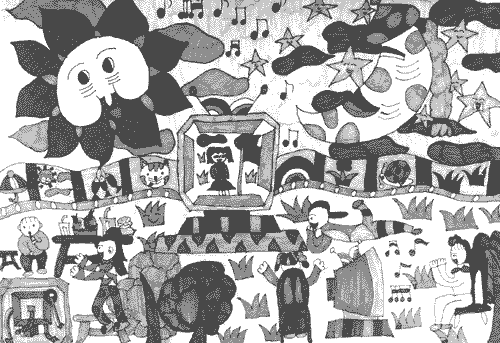 ↑All of The Children Watching Films Good films are valuable resources. One legend story tells that a man happens to drink life water in the forest and turns young suddenly. He returns village and asks people to carry the water into village with bamboo pipes so that everyone in the village could drink the water and become young. This is called sharing resource. Textbooks are compiled with excellent articles of the world, and science textbooks include the great discoveries and inventions in each scientific field. It is necessary to take initiative in providing films to our children and compiling film course eventually in order to fulfill missions of education in history. How films in film course are selected?
Please refer to the comment on our selection given by Film & Television Programs Coordination Committee for Students of Primary and Middle School under the Ministry of Education, The Ministry of Culture and State Administration of Radio, Film & TV as follows:
To: Sun chime Movie Collection Research Team As per the request of Madame Yi LAN, your team provided us 21 different titles of film screening tapes on dogs with data of survey of experimental schools. Thank you for your great support for our research. We believe the methods and procedure of selecting good films by Film Course Research Team are valid and creative. You have selected 21 films from 328 different titles of films on dog produced by many countries of the world and send them to 28 experimental schools for 35,000 students reviewing. Experts have evaluated film course based on the data -collected directly from student's comments on the films. Results of this research would improve the production quality of children films as well distribution systems in China. We are appreciated what you have done and consider most of the films you provide us are excellent ones which reflect your aim to present all the best films in the world to our children. We think these films are very good for children development because they are suitable for children interests with healthy and attractive content. After years of hard work, film course project has been recognized more and more by a wide variety of people. Not only teachers but also parents agree that film course is a useful means to enlarge the scope of students? Knowledge. By seeing films from different countries, students have an access to different cultures in the world. With the spread of film course in more areas in China, more and more children, including those in remote and poverty stricken areas will benefit from this project From left to right:
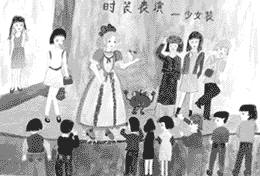 ↑Urgly duck in modern time
 ↑Simbar's pride

 ↑Shi Jiannong Introduction Either because of the sparseness of cultural life of the time when I was young, or because of the great influence of films on children, the films I saw twenty five years ago left me a deep impression. It was very normal for my peers and I to walk several kilometers from one village to another to see a film. Several kilometers may not be too much for an adult, but it is a long way for an 8- or 9-year-old child. It is a challenge for a child of that age to walk several kilometers unless he is strongly motivated. Because of shortage of film copies at that time, reels of one film were shared among several villages and shown in the open air. In order to have a film shown in different villages at the same time, people had to send a copy from one village to another on foot. Children followed the film projecting team from one village to another so as to have more chances to enjoy movies. Sometimes, we had to walk more than ten kilometers in one evening or over a night. It seems incredible today for children to walk several kilometers only to see a film repeatedly, but it was very common for children in remote villages of China in 1970s. Several years later when I grew up, I have learned that people spend a lot of money, time and effort in producing a film. Sometimes, movie artists have to devote their lives to it. It made me cherish movies and cinematic more than before. In the meantime, I wonder: "Why do people spend so much time and money in producing films? Why are children so fond of seeing films? What can they benefit from seeing films?..." Film course and EBHN In recent years, Education Based on Human Nature (EBHN) (called Quality Education or Essential Quality Education) has spread out in nationwide or worldwide scope. What does EBHN (Education Based on Human Nature) mean? In our opinion, the EBHN is an educational intervention based on human nature. The purpose is to cultivate and keep appropriate behaviors or traits of human being. In order to understand the definition of EBHN, we need to clarify what human nature or essential trait is. Human being has three features: a) he is a biological individual with physiological features; b) he is a mental individual with intellectual features; c) he is a social individual with social features (Shi & Xu, 1999). These three features are organically integrated. The relations among them are illustrated in figure 1.
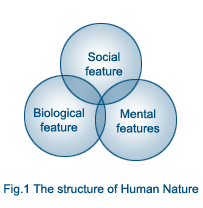 According to structure of human nature, Education Based on Human Nature includes three main aspects: physical education, mental education, and social education. Each aspect consists of several sub-categories. Physical education includes knowledge about genetics and eugenics, nutrition, physical development, physical exercise or training, etc. The society or educational system should provide enough facilities or equipment and arrange enough time for children to do exercise. In mental education, human cognition, emotion, personality, perseverance, and other psychological aspects should be concerned. In social education, self-consciousness, social morality, law and so on should be focused on. The structure of EBHN is illustrated in fig.2.
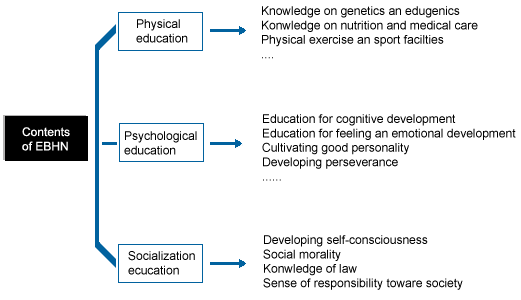
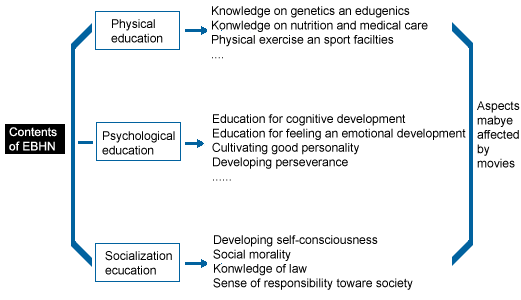
Film course and children's values In present project, more than 50 primary schools have been chosen as our experimental schools. Each of them obtains copies of 500 films from the research project. Every week, one or two classes are arranged for students to see films. Each class lasts one or one and a half hours. (Sometimes it lasts two hours, depending on the length of the film). One or two teachers are assigned as film course teachers to organize students to see films. Students can discuss with each other on a film or write what they have learned from the film after they see it. The difference between film course and other course is that in
 ↑Students engoying film
film course, there is no assignment or exam after class. Students are encouraged to write down their comments on films. There is no requirement on their writings. They can write a whole page or just a sentence. (For example, "I felt very happy after I saw the film."). And they can also write pages of new scripts for the cartoons they have seen. Any of children's comments have received positive response from their teachers. in Grade Two to Grade Five were asked to fill questionnaires. Half of them are from experimental schools and half from non-experimental ones in the same region. Items of the questionnaire include school performances, their favorite careers, people they admire most, places they like best, reasons why they choose the schools, the course they are most interested in, and so on. "People I admire most" To find out that children admire most, students were asked to list them in an open questionnaire. The results are listed in table 1. From table 1, we can see that the top five rated by students in experimental schools are politicians, movie stars, scientists, father, and sports stars respectively. But the top five for students in non-experimental schools are mother, father, teacher, classmates, and political leaders respectively. The results in the table 1 indicate that experimental and non-experimental students differ in whom they admire most
 Ideal careers The students' career preference reflects their career interests and the goal of their effort. We asked students to select their most favorable career from a list of careers. They can also write down their own most favorable careers in blanks, if they are not in the list. The results are presented in table 2.
 From table 2, we can see that in experimental schools, the top 1 to 5 most favorable careers listed by students are scientists, artists, policemen, sports stars, and movie stars, while for those in non-experimental schools, the top 1 to 5 are artists, policemen, sports stars, scientists, and medical doctors. Seen from what are listed, the most favorable careers are similar for students in experimental and non-experimental schools, but the order is different. In order to find out students' reasons of choosing schools, we asked students to write down three main reasons. The results are listed in table 3.
 The data collected in present study are not fully analyzed up to now. In general, we find that children in similar age are similar in people they admire most, most favorable careers, and reasons of choosing the schools, as well as values toward world and life. However, there are some differences between experimental school students and non-experimental school students in some aspects. Based on our findings, we conclude that film course does have influence on children's development in some degree.

 ↑Wang Liuyi I The Concept of Film Course Film course is a course to provide students with films appropriate to their age so that they could appreciate excellent films in primary schools. Experts both in film and educational fields have taken part in the whole process of selecting films, collecting students' comments on films, analyzing information gathered as well as making reference to the syllabus promulgated by the Ministry of Education. The selected films vary in artistic forms, motifs and national styles. II Purposes of the Project It is our aim to investigate, analyze, study and verify the effect of the whole collection of films consisting of 500 films in 36 categories. In specific, our purposes are: III Guidelines of Selecting Films 1. Content of films: to selected films is to meet needs of students in different age group with proper arrangement. Films vary in content according to students' age levels. 2. Length of films: in general, length of films is restricted from 60 to 90 minutes according to the attention span of children in different age groups. Generally speaking, a film for children of grade 1-2 should be limited to 60 minutes while children in grade 3-4, 70-80 minutes and in grade 5-6, about 90 minutes. IV Implementation of Film Course Our film course is a long-time project of 6 years. In together, 56 schools in China have been chosen as voluntary experimental units. Each school set up a team working under the guidance of specialists in charge of the project. Film course has been included in the normal teaching activities in the schools. Within one school year, 80 films have been shown, 2 films per week on average. In six years, 500 films will be shown to students. In each class, specific films are shown and teachers hold discussions afterward. Fund of Film Course The fund of experimental film course of 32 schools are collected through the following channels:Mainly, the fund is supplied by schools themselves. 25 schools, which occupy 78% of all the schools directly, provide
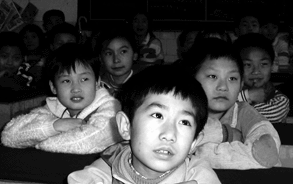 ↑Simbar's pride in 35% of the experimental schools, students and their parents pay the fee in different ways. For example, 10 schools charge the students of the fee as part of tuition. 3% of the experimental schools buy the membership cards to rent film on VCD. The third channel of fund is allocation. 9.4% of the school are allocated to fund. 9 schools collect the fees through two or three channels mentioned above. These schools occupy 28% of all the schools.
Equipment for Film Course The students in 22 schools, which occupy 69% of all, watch film through school cable TV. The rest of schools organize their students to watch films through TV projection and videotape recorders. Numbers of Films Viewed by Students The average number of films, which students viewed, is 92 titles according to the survey of the 32 schools. The maximum of films, which students viewed, is 420 titles and the minimum is 20. In one semester, students viewed 40 titles on average.
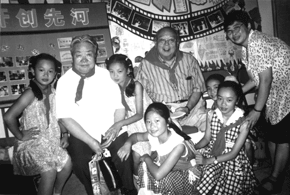 ↑Take a picture with old famous film actors 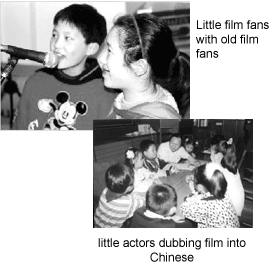 Appendix: 36 categories of films in film course |